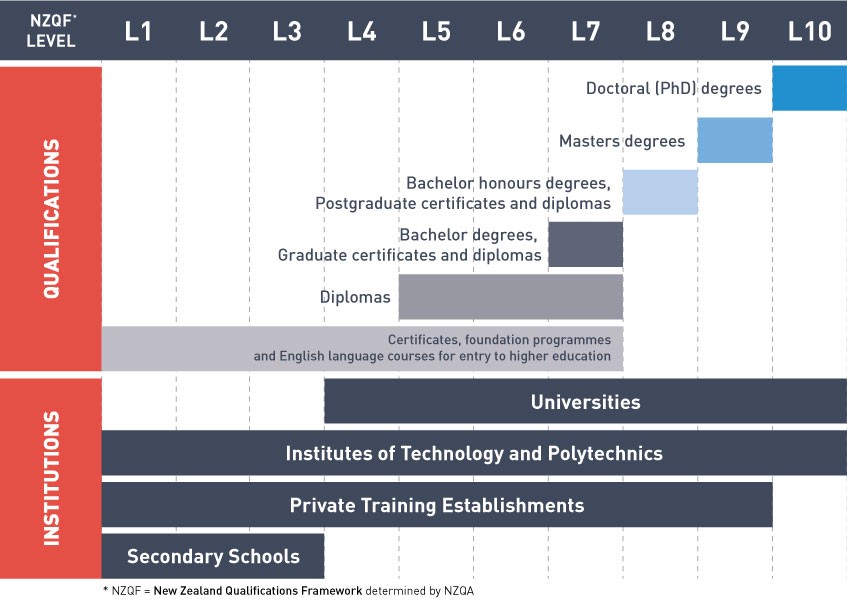Education in New Zealand
New Zealand’s education system has 3 levels:
- early childhood education— from birth to school entry age;
- primary and secondary education— from 5 to 19 years of age;
- tertiary education (higher and vocational education) -16+years.
On average, school education takes 13 years. It is important to understand that children can start school at the beginning of any term at the age from 5 to 6 years old. That will depend on the parents and/or child’s readiness to school.
New Zealand has strong quality assurance systems in place to ensure consistent, high-quality education across all levels of the education system. These systems are regulated by a number of government agencies, including the Ministry of Education.
 QUALIFICATION LEVELS
QUALIFICATION LEVELS
The New Zealand Qualifications Framework has 10 qualifications levels. According to the Ministry of Education, these levels are based on complexity, with level one the least complex and level ten the most complex.
Level 1-4 are broadly comparable to senior secondary education (high school or basic trades training).
Level 5-6 cover advance trades, technical and business qualifications.
Level 7-10 cover degrees, graduate and postgraduate qualifications. The above information could be also found at the Ministry of Education web-site.
NCEA (The National Certificates pf Education Achievement) are the national senior secondary school qualifications.
For most students, the 3 levels (Level 1,2 and 3) of NCEA correspond to the final three years of secondary schooling (Years 11 to 13).
NZCA Level 3 results are used for university entrance.
In case of international students, they can submit a certificate of secondary education from their home country together with IELTS (or equivalent test results) if required. That puts them on Level 3 in terms of the New Zealand Qualifications Framework.
Often times, international students with a Bachelor’s Degree from their home country when considering study in New Zealand get confused with regards to the course level that would be the best for them. In this case, we can advise on a case-by-case basis depending on student’s objectives and work experience. All these factors will affect the choice of the right course and the right level of study.
According to the current immigration law (changes enforced on 26 November 2018), international students graduating from a course at levels 4-6 (2 year course) or level 7, are eligible for 1 year post-study work visa, if studied in Auckland, or 2 year post-study work visa, if studied outside Auckland.
If a student received a Bachelor’s degree in New Zealand, he/she is entitled to a 3 year post-study work visa. The same applies to graduates of Diploma courses at level 8 and above.
All the above information with regards to post-study immigration opportunities can be found at Immigration NZ.

